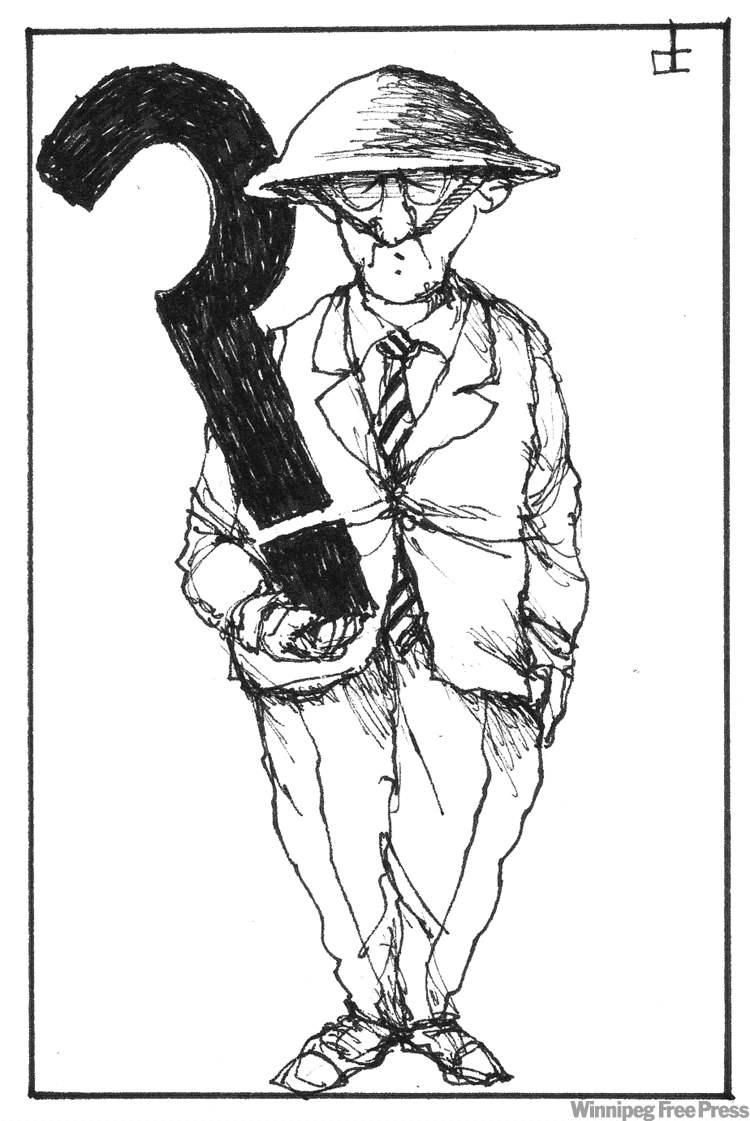Making sense of war
Advertisement
Read this article for free:
or
Already have an account? Log in here »
To continue reading, please subscribe:
Monthly Digital Subscription
$0 for the first 4 weeks*
- Enjoy unlimited reading on winnipegfreepress.com
- Read the E-Edition, our digital replica newspaper
- Access News Break, our award-winning app
- Play interactive puzzles
*No charge for 4 weeks then price increases to the regular rate of $19.00 plus GST every four weeks. Offer available to new and qualified returning subscribers only. Cancel any time.
Monthly Digital Subscription
$4.75/week*
- Enjoy unlimited reading on winnipegfreepress.com
- Read the E-Edition, our digital replica newspaper
- Access News Break, our award-winning app
- Play interactive puzzles
*Billed as $19 plus GST every four weeks. Cancel any time.
To continue reading, please subscribe:
Add Free Press access to your Brandon Sun subscription for only an additional
$1 for the first 4 weeks*
*Your next subscription payment will increase by $1.00 and you will be charged $16.99 plus GST for four weeks. After four weeks, your payment will increase to $23.99 plus GST every four weeks.
Read unlimited articles for free today:
or
Already have an account? Log in here »
Hey there, time traveller!
This article was published 10/11/2011 (5135 days ago), so information in it may no longer be current.
All wars are controversial, even when there’s a consensus that they were worth the cost in blood and treasure. In Canada after the Second World War, for example, there were inquiries and recriminations over the disasters at Hong Kong and Dieppe, and much later, over the bombing campaign against Germany and the treatment of minorities, particularly Japanese Canadians.
After the Great War, bitter questions were asked about a decision to order Canadian troops into combat on the last day of the conflict, resulting in pointless casualties. In both wars, there were questions about the quality of political and military leadership.
Some of these criticisms were met with the refrain that old wounds are best forgotten. But Remembrance Day is not a time to forget. It is, among other things, a time to try to make sense out of what happened in the past.

This Remembrance Day — 11/11/11 — marks the first time in 10 years that Canadians are not engaged in combat in Afghanistan, or, as was frequently the case, struggling to determine our proper role in the country, or whether we should have been there in the first place.
Canadian troops will remain in the country for another two years as trainers and mentors, but there has been no discussion about what role, if any, Canada might play after 2014. And there has been virtually no serious attempt to understand the last 10 years. It’s almost, as one commentator observed, like “the war never really happened.”
Indeed, Canadians seem overwhelmingly relieved that it is over, even though they barely showed any interest in the conflict when it was on. The apathy can be traced to the fact that Canadians were not asked to pay a price for the war, unless they were related to the roughly 160 Canadians, mainly soldiers, killed in the conflict, along with thousands of others who were injured, either physically or mentally.
The politicians also did a poor job at explaining the war to Canadians. It was barely raised during the last several elections and political leaders avoided the subject as much as possible.
A new study, however, the first since Canadian combat operations ended, sheds new light on the conflict. In What Canada Should Learn from Afghanistan, historians Jack Granatstein and David Bercuson praise the military’s ability to adapt and improvise under difficult conditions, but they are critical of politicians and bureaucrats, who they say failed to provide clear policy priorities during the war, fuelling the general confusion in the country about the purpose of the effort.
The historians also say Canada decided to deploy troops to Kandahar, the most dangerous place in Afghanistan, apparently to garner influence in Washington and NATO headquarters on the future course of the war, but in the end neither the Bush nor the Obama administrations cared much about what Canada thought. Worse, the political and bureaucratic leaders did not fully appreciate the strength of the insurgency in Kandahar and they took on the commitment without ensuring support from other NATO countries, leaving Canada alone to police the entire Afghan province. Ultimately, everyone in the Canadian military-political establishment was “shocked” at the difficulty of the mission, the authors say. They also question whether anyone in government attempted to form a complete picture of the task.
The military was enthusiastic about the deployment because it wanted to shed the army’s old image as blue-helmeted peackeepers. As retired general Rick Hillier said at the time, “We’re the Canadian Forces. We kill people.”

Despite the missteps, Granatstein and Bercuson say the war was just and Canada was right to participate.
On Remembrance Day, then, it’s worth recalling that while wars may sometimes be justified, that doesn’t mean they are always properly planned and executed.
Politicians, and not just the generals, must also learn the lessons of war.


